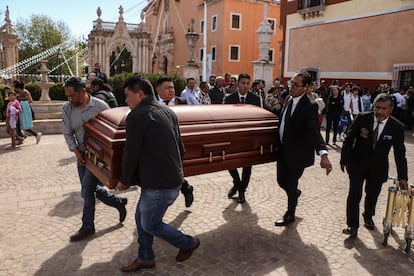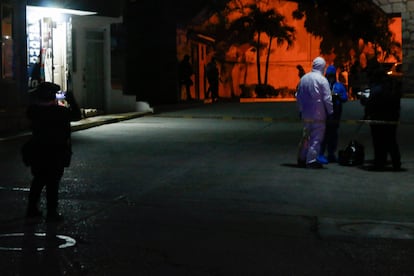Mexico’s elections come with a spike in the murder rate of politicians running for office
Crimes against candidates and political officials mark the start of the country’s presidential campaign


Elections in Mexico are always preceded by dozens of assassinations. Killing is the way to define the electoral cartel: if a candidate shows himself to be a possible winner, the opponent will shoot him twice and that’s that. Sometimes they are killed before they can even run. The presidential and congressional campaign begins on March 1, as do the electoral campaigns of thousands of local government figures; the June 2 elections include a total of 20,375 candidates. Organizations that track this statistic have already counted a dozen people killed for their electoral ties, and the campaign has not even begun yet. By the time you read this article, the figure will have risen; there is not a day that goes by that Mexican newspapers do not report new victims in a still imperfect democracy.
In the most recent elections, in June 2021, the consulting firm Etellekt kept count: at least 35 candidates were killed, and no major changes are expected this time. Those who kill, or rather, issue orders to kill, are politicians or criminals, sometimes both. They want to place allies in local government to facilitate not only command and access to the public budget but also organized crime in those areas, which is why these crimes occur mostly in relatively remote municipalities, although that is not always the case. Without reaching the extent of an assassination like the 1995 murder of Institutional Revolutionary Party (PRI) presidential candidate Luis Donaldo Colosio, even without explaining who pulled the trigger, many are killed in small towns and the stories then reach the media.

Last week, two crimes were especially notable, since the victims were relatives and died in the same town, Fresnillo, one of the country’s most violent places, in the state of Zacatecas. Juan Pérez Guardado was the brother-in-law of Senator Ricardo Monreal, one of Mexico’s best-known political figures. He was killed on February 7. Four days later, Jorge Antonio Monreal, the nephew of the senator and the Governor of Zacatecas, David Monreal, was shot and killed. Politicians know what they are getting into when they run for office in Mexico or even when they work in public administration, especially in some of the more violent areas.
The three presidential candidates have good security details organized by the military, the national guard and other agents. However, the fight is fiercer at the local level, where organized crime is running rampant. The number of all kinds of attacks that seek to kill or intimidate, rises to the hundreds, 782 in 2021; they break into homes, kidnap, torture, threaten or shoot. Woe to anyone who finds a tree or a stone in the road and gets out of the car. But that is only one method, there are several of them, depending on whether the crime is committed in plain sight or in the dark.
Mexico’s democracy has made progress, which translates into almost free elections with diverse results. Long gone is the time of the single party, when no one wondered who would win the country’s elections; the answer was always the same, the PRI. Paradoxically, that circumstance, which was described as the perfect dictatorship, greased the system in such a way that nobody stepped out of line and crimes were fewer. With the advance of democracy, the scheme broke down, and now many are dissatisfied and resort to arms to guarantee their desired result. As the expert Rubén Salazar pointed out to this newspaper, “Mexico has not yet digested the transfer of power.”

“In this country, crime continues to condition electoral processes, especially at the local level, where they have a bigger presence and ability to bring pressure to bear,” explains José Antonio Álvarez León, an expert in Criminal Law and Policy at the National Autonomous University of Mexico (UNAM). “And it is hard to say when this will end because the tentacles of the powers that be are very powerful; there are times when the transfer of power between one party and another in any government means nothing, because everyone knows who is really ruling,” he explains.
However, he believes that some rules could be implemented. “If exceeding the planned spending for elections is grounds for the annulment of a candidacy, why isn’t an assassination? I think the process should be annulled and then repeated. If everything proceeds, it’s a sign that what happened doesn’t matter all that much,” he says. “If there were more vigilance for the transparency of the process, perhaps criminals would look the other way,” the UNAM professor observes. But it does not seem that things are going in that direction at this time; increasingly, the narcotraffickers like to meddle in the municipalities’ public money and human resources.
The result of these crimes is that the party running the victim is left without its strongest candidate, people feel fear and no one dares to make things more difficult for the alleged perpetrator. This cannot be called a truly democratic process. Political parties and crime tend to subsume each other in remote places. If one party has a chance of winning, criminals will ally with that candidate, or kill the one that overshadows its aims, you never know what the formula is, Álvarez León explains. “Apparently, they both win; there is a lot of negotiation going on behind the scenes,” he says.
It is difficult to say whether Mexico has a lack of democracy or a surplus of criminals, if people have not become accustomed to a peaceful transfer of power or they will not allow them. Sometimes they are two sides of the same coin.
Sign up for our weekly newsletter to get more English-language news coverage from EL PAÍS USA Edition
Tu suscripción se está usando en otro dispositivo
¿Quieres añadir otro usuario a tu suscripción?
Si continúas leyendo en este dispositivo, no se podrá leer en el otro.
FlechaTu suscripción se está usando en otro dispositivo y solo puedes acceder a EL PAÍS desde un dispositivo a la vez.
Si quieres compartir tu cuenta, cambia tu suscripción a la modalidad Premium, así podrás añadir otro usuario. Cada uno accederá con su propia cuenta de email, lo que os permitirá personalizar vuestra experiencia en EL PAÍS.
¿Tienes una suscripción de empresa? Accede aquí para contratar más cuentas.
En el caso de no saber quién está usando tu cuenta, te recomendamos cambiar tu contraseña aquí.
Si decides continuar compartiendo tu cuenta, este mensaje se mostrará en tu dispositivo y en el de la otra persona que está usando tu cuenta de forma indefinida, afectando a tu experiencia de lectura. Puedes consultar aquí los términos y condiciones de la suscripción digital.








































